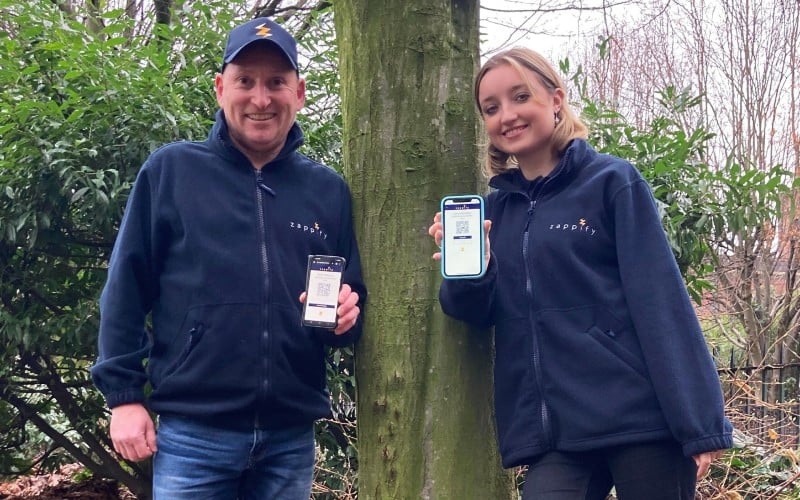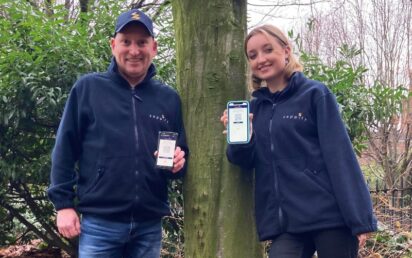The green agenda is fuelling bumper growth for the company behind a virtual business card.
Zappify has seen a five-fold increase in the number of individual and corporate subscribers in the past 12 months as companies put more emphasis on sustainability as a key plank of their strategies.
The resumption of in-person events, meetings and networking following the pandemic is also helping to drive Zappify’s growth, said co-founder Keith Robinson.
Its expanding subscriber base includes solicitors, accountants, banks, global consulting firms, and companies involved in sectors ranging from manufacturing, telecoms, leisure and hospitality to travel, creative and construction.
Robinson and fellow director Paul Smith, who are both based in Bury, launched the fully digital virtual card during lockdown in 2020 as an alternative to traditional printed cards.
Users swap their details in person or over video conferencing platforms, email and messaging apps on their smartphones via a unique QR code or personal URL.
Zappify has now recruited Manchester Metropolitan University graduate Lauren Grantham as a full-time digital marketing specialist to work alongside Robinson, Smith and Amy Conlock – the company’s head of marketing – to further develop the platform.
“We are excited to have Lauren on board, and look forward to a bright future for the business despite these difficult economic times,” said Robinson.
“We are amassing a high-quality portfolio of clients and have attracted thousands of new users across scores of businesses over the past 12 months.
“The exceptional customer feedback has been rewarding, with clients consistently praising the ease of use and support levels. This has been invaluable to help us develop additional functionality to the virtual card over the past year, and we will be introducing further significant enhancements to the Zappify platform in 2023 to improve the user experience even more.
“There is now a paradigm of step change in business at all levels for sustainability, with serious momentum behind it, and we are proud of the role that Zappify can play in achieving progress in this area.”
The virtual business card has three versions – one for individuals, a corporate card for smaller businesses and the enterprise card for larger companies with multiple offices, brands or subsidiaries. The annual subscriptions are £10 for individuals, £99 for the corporate version and £499 for the enterprise version. All data is held securely in the UK and is GDPR compliant with endorsement from the Information Commissioner’s Office.
Administrators of the corporate and enterprise versions within each company issue virtual cards to employees to maintain brand consistency, and can personalise the template and wording to suit changes in office locations, personnel and brand identities.
Zappify’s research has shown that it takes almost seven litres of water to create 10 business cards. Every year, 10 billion business cards are printed globally, and 88 per cent are thrown away within a week. Six million trees are destroyed every year to produce paper cards.
Robinson added: “By replacing traditional printed cards with a phone app, the result is a digital, paperless and contactless solution for businesses of any size.
“If each employee at a company with a workforce of 100 uses 500 cards in a year, switching to a virtual business card would save three trees and 32,500 litres of water in 12 months. Multiply those statistics for a city, region or nationally and it’s a real eye-opener when you consider it this way, and is making it an easy decision for individuals and companies to switch to Zappify.
“As businesses increasingly seek to do the right thing in terms of sustainability, the eco-friendly nature of the card is the primary driver for our continued growth.
“However, the value of a virtual card goes beyond the obvious sustainability advantages, as it’s generally much cheaper than a printed card and can be shared more extensively as it’s digital, which means users can do more with it. It can easily be updated, and can be shared over platforms such as Zoom and Teams.
“Most practically, users will probably always have their card with them, as it’s on their phone.”
He added: “We have a fully scalable solution that’s cost-effective for the individual freelancer through to the multinational conglomerate.”
During 2022, Zappify introduced a number of features. A networking module in the app enables premium users to tag new contacts and then make some notes about things to follow up. There is also an option to share their colleagues’ details, to introduce an external contact to the right person working elsewhere in their business. The colleague is then notified of their new connection.
The virtual business card also now features new options for background corporate imagery, promotional video content for their business and additional security features and encryption.
Zappify is a self-serve platform and has issued a series of informative guides showing how subscribers can get the most out of their virtual card.
The company has launched an eco-impact calculator on its website to coincide with ‘Green January’ so subscribers can estimate for themselves how many trees and litres of water are saved by their adoption of the virtual card.
Robinson said: “The virtual card is adaptable and intensely agile, so it is constantly being updated. This year, we are looking at bespoke product developments for each client, with a number of trials underway with global companies to help them get even more out of the product.
“We continue to innovate and take the product way beyond a business card as it evolves into a great digital marketing tool.”


